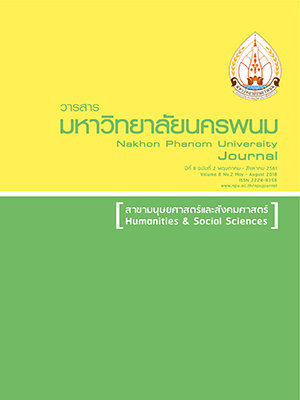ประสบการณ์การปรับตัวของเยาวชนไทยที่ย้ายถิ่นติดตามมารดามาอาศัย ณ กรุงสตอกโฮล์ม ประเทศสวีเดน
Main Article Content
Abstract
The purpose of this qualitative research was to explore the adaptation experience of Thai youths who immigrated with their mothers to live in Stockholm, Sweden. The key informants of research were 7 Thai youths, who immigrated with their mothers to live in Stockholm, Sweden, purposively selected based on their age of 11 – 18, stayed in Sweden not lower than one year, had a Swedish adoptive father, were able to communicate in Thai and willing to participate in this research. The employed research instruments were a semi–structured interview form, a participatory observation recording form, and a field recording form. Analysis of data was conducted using context and content analyses. Findings of the research revealed that the adaptation experience comprised 4 main themes: (1) state of mind prior to migration, which included 3 sub-themes: 1) not wanting to leave Thailand, 2) missing and caring for those who were left behind and 3) being anxious about the future. (2) The confronted obstacles which were divided into 9 sub-themes: 1) longing to be back to Thailand, 2) feeling inferior in the eyes of others, 3) having problems in using language and communication 4) family members being strangers, 5) being unfamiliar with the society, people and culture, 6) feeling hopeless and frustrated with difficulty in learning, 7) lack of friends to rely on while suffering, 8) food eaten being unfamiliar with tongue and 9) being unfamiliar with the weather. (3) The adaptation to new society which was divided into 5 sub-themes: 1) opening one’s mind and being ready for adaptation to the changes, 2) building self-respect and self-esteem, (3) having skills of life in the new society, 4) having leisure time activities for recreation and extra incomes, and (5) receiving helps from different agencies. (4) The goal of life which was divided into 3 sub-themes: 1) education being really important, 2) achieving for education degree, and 3) back to develop their homeland.
Article Details
References
เอมอร กฤษณะรังสรรค์. (2556). ทักษะการสร้างสัมพันธ์กับผู้อื่น. สืบค้นเมื่อเมษายน 2560 จาก : hppts://www.novabizz.com/NovaAce/Relationship/Skill.htm
Dicker, G. (2005). Kant’s the theory of knowledge: An analytical introduction. Oxford University Press.
Jameson, S. (1999). The functions of social conflict. In M.S. Mander (Ed.), Framing friction: Media and social conflict (pp. 1-57). University of Illinois Press. –
McLeod, S. (2014). Roger’s Theory “The Simply-Psychology,” The University of Manchester. Retrieved June 2017, from https://www.simplypsychology .org/saul-mcleod.html
Moa, S., & Sundell, K. (2014). Children of Immigrations: The Impact of biculturalism of identity. Bachelor’s Degree Project. 15 HEC Study Program of International Social Work Degree Project. Hogskolan I Gavle Sweden.
Roy, C. (2016). Roy’s adaptation model B: The celebrating 50 years of the RAM and 25 years of the RAA. Boston College press
Thailändare i Sverige. (2016). Wikipedia. org Sweden. Retrieved October, 2017 from https://sv.m.wikipedia.
org/wiki/thailandare_i_Sverige
Thai Embassy. (2015). Thai People Hand Book, Stockholm Sweden. Retrieved September 2017, from https://www.informationsverige.se


